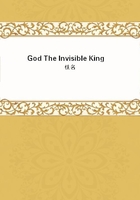
第29章
And that idea of God as the Invisible King of the whole world means not merely that God is to be made and declared the head of the world, but that the kingdom of God is to be present throughout the whole fabric of the world, that the Kingdom of God is to be in the teaching at the village school, in the planning of the railway siding of the market town, in the mixing of the mortar at the building of the workman's house. It means that ultimately no effigy of intrusive king or emperor is to disfigure our coins and stamps any more; God himself and no delegate is to be represented wherever men buy or sell, on our letters and our receipts, a perpetual witness, a perpetual reminder. There is no act altogether without significance, no power so humble that it may not be used for or against God, no life but can orient itself to him. To realise God in one's heart is to be filled with the desire to serve him, and the way of his service is neither to pull up one's life by the roots nor to continue it in all its essentials unchanged, but to turn it about, to turn everything that there is in it round into his way.
The outward duty of those who serve God must vary greatly with the abilities they possess and the positions in which they find themselves, but for all there are certain fundamental duties; a constant attempt to be utterly truthful with oneself, a constant sedulousness to keep oneself fit and bright for God's service, and to increase one's knowledge and powers, and a hidden persistent watchfulness of one's baser motives, a watch against fear and indolence, against vanity, against greed and lust, against envy, malice, and uncharitableness. To have found God truly does in itself make God's service one's essential motive, but these evils lurk in the shadows, in the lassitudes and unwary moments. No one escapes them altogether, there is no need for tragic moods on account of imperfections. We can no more serve God without blunders and set-backs than we can win battles without losing men. But the less of such loss the better. The servant of God must keep his mind as wide and sound and his motives as clean as he can, just as an operating surgeon must keep his nerves and muscles as fit and his hands as clean as he can. Neither may righteously evade exercise and regular washing--of mind as of hands. An incessant watchfulness of one's self and one's thoughts and the soundness of one's thoughts; cleanliness, clearness, a wariness against indolence and prejudice, careful truth, habitual frankness, fitness and steadfast work; these are the daily fundamental duties that every one who truly comes to God will, as a matter of course, set before himself.
5. THE INCREASING KINGDOM
Now of the more intimate and personal life of the believer it will be more convenient to write a little later. Let us for the present pursue the idea of this world-kingdom of God, to whose establishment he calls us. This kingdom is to be a peaceful and co-ordinated activity of all mankind upon certain divine ends. These, we conceive, are first, the maintenance of the racial life; secondly, the exploration of the external being of nature as it is and as it has been, that is to say history and science; thirdly, that exploration of inherent human possibility which is art; fourthly, that clarification of thought and knowledge which is philosophy; and finally, the progressive enlargement and development of the racial life under these lights, so that God may work through a continually better body of humanity and through better and better equipped minds, that he and our race may increase for ever, working unendingly upon the development of the powers of life and the mastery of the blind forces of matter throughout the deeps of space.
He sets out with us, we are persuaded, to conquer ourselves and our world and the stars. And beyond the stars our eyes can as yet see nothing, our imaginations reach and fail. Beyond the limits of our understanding is the veiled Being of Fate, whose face is hidden from us. . . .
It may be that minds will presently appear among us of such a quality that the face of that Unknown will not be altogether hidden. . . .
But the business of such ordinary lives as ours is the setting up of this earthly kingdom of God. That is the form into which our lives must fall and our consciences adapt themselves.
Belief in God as the Invisible King brings with it almost necessarily a conception of this coming kingdom of God on earth.
Each believer as he grasps this natural and immediate consequence of the faith that has come into his life will form at the same time a Utopian conception of this world changed in the direction of God's purpose. The vision will follow the realisation of God's true nature and purpose as a necessary second step. And he will begin to develop the latent citizen of this world-state in himself. He will fall in with the idea of the world-wide sanities of this new order being drawn over the warring outlines of the present, and of men falling out of relationship with the old order and into relationship with the new. Many men and women are already working to-day at tasks that belong essentially to God's kingdom, tasks that would be of the same essential nature if the world were now a theocracy; for example, they are doing or sustaining scientific research or education or creative art; they are making roads to bring men together, they are doctors working for the world's health, they are building homes, they are constructing machinery to save and increase the powers of men. . . .